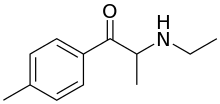4-Methylethcathinone
4-Methylethcathinone or 4-MEC is a chemical that bears a chemical resemblance to mephedrone.[2] Due to its similarity to mephedrone, it is thought to be a stimulant and entactogen drug of the phenethylamine, amphetamine, and cathinone chemical classes.[3] It has been marketed alone or in mixtures with other substituted cathinones under the name "NRG-2", although other blends such as "NRG-1" may have been more ambiguous with their ingredients.[4]
 | |
| Clinical data | |
|---|---|
| Other names | 4-Methyl-N-ethylcathinone; 2-Ethylamino-1-p-tolylpropan-1-one |
| Legal status | |
| Legal status |
|
| Identifiers | |
| |
| CAS Number |
|
| PubChem CID | |
| ChemSpider | |
| UNII | |
| Chemical and physical data | |
| Formula | C12H17NO |
| Molar mass | 191.274 g·mol−1 |
| 3D model (JSmol) | |
| |
| |
| | |
4-MEC is reported to have been used as the active ingredient in fake "Ecstasy" pills in some countries such as New Zealand.[5]
Recreational use
Some users have injected the drug intravenously. This requires heating the water/4-MEC solution in order for 4-MEC to dissolve. Injecting 4-MEC appears to be rough on veins and is sometimes accompanied by a burning sensation; for this reason 4-MEC should be diluted as much as possible. Intravenous dosages are comparable to oral ones, although more care should be given to safety (with regard to possibility of overdose and long-term effects).[6][7]
See also
References
- "Ustawa z dnia 15 kwietnia 2011 r. o zmianie ustawy o przeciwdziałaniu narkomanii ( Dz.U. 2011 nr 105 poz. 614 )". Internetowy System Aktów Prawnych. Retrieved 17 June 2011.
- Ondra P, Válka I, Knob R, Ginterová P, Maier V (October 2015). "Analysis of Amphetamine-Derived Designer Drugs by Gas Chromatography with Mass Spectrometry". Journal of Analytical Toxicology. 40 (1): 78–85. doi:10.1093/jat/bkv113. PMID 26446487.
- Helfer AG, Turcant A, Boels D, Ferec S, Lelièvre B, Welter J, et al. (May 2015). "Elucidation of the metabolites of the novel psychoactive substance 4-methyl-N-ethyl-cathinone (4-MEC) in human urine and pooled liver microsomes by GC-MS and LC-HR-MS/MS techniques and of its detectability by GC-MS or LC-MS(n) standard screening approaches". Drug Testing and Analysis. 7 (5): 368–75. doi:10.1002/dta.1682. PMID 24953431.
- Brandt SD, Sumnall HR, Measham F, Cole J (July 2010). "Second generation mephedrone. The confusing case of NRG-1". BMJ. 341: c3564. doi:10.1136/bmj.c3564. PMID 20605894.
- "Man in court after bust turns up drugs, cash". May 24, 2012 – via www.nzherald.co.nz.
- Brandt SD, Sumnall HR, Measham F, Cole J (August 2010). "Analyses of second-generation 'legal highs' in the UK: initial findings". Drug Testing and Analysis. 2 (8): 377–82. CiteSeerX 10.1.1.667.4728. doi:10.1002/dta.155. PMID 20687197.
- Jankovics P, Váradi A, Tölgyesi L, Lohner S, Németh-Palotás J, Koszegi-Szalai H (July 2011). "Identification and characterization of the new designer drug 4'-methylethcathinone (4-MEC) and elaboration of a novel liquid chromatography-tandem mass spectrometry (LC-MS/MS) screening method for seven different methcathinone analogs". Forensic Science International. 210 (1–3): 213–20. doi:10.1016/j.forsciint.2011.03.019. PMID 21498012.